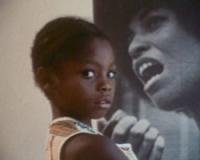At the panel on Sunday, there were three main issues expressed by the filmmakers of the L.A. Rebellion. Throughout much of their conversation the topics of hope, despair and inspiration were repeated in various contexts. These may seem like vague, abstract or even cliché terms, but they can be useful in considering the historical contexts of the work that was presented and the time period in which these films came together.

For many of the filmmakers, there was a hope that their actions in the past changed something for future filmmakers to come. Each of these unique individuals had hope within them that they protected and nurtured to reach their accomplishments, even when it seemed unlikely that their films would come to fruition or find large distribution and viewership. Despair, as was specifically hit upon in an audience question, was also a large part of this discussion by those involved in the L.A. Rebellion. There was personal despair each artist faced that presented insurmountable barriers to creative production. There was also the despair collectively shared in negotiating the larger economics of the film industry and market trends, both in the United States and abroad, which ultimately influence production practices.

Towards the end of the conversation, the theme of inspiration became a focus of the panel. As another audience member commented during the Q&A, many of these filmmakers had already moved into larger productions by the time many students were beginning their own film careers at UCLA in the early 1990s. Overall, while the conversation between the filmmakers and audience struck many different points between many different voices, the invaluable legacy of these works became clear.
—Laura Paul






 Mobile Navigation
Mobile Navigation


Comments